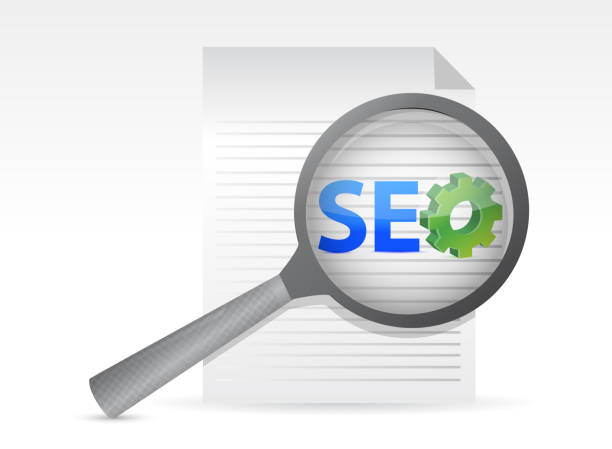What is SEO? Understanding the Fundamental Concepts of Search Engine Optimization

#SEO or Search Engine Optimization is a vital process for improving your website’s visibility in the organic search results of search engines like Google.
It includes a wide range of techniques and strategies whose ultimate goal is to increase the quality and quantity of traffic to the site through unpaid search results.
In fact, SEO helps search engines better understand your content and display it to relevant users.
The importance of SEO goes beyond merely appearing on the first page of results; it means securing a reliable position for target keywords that can lead to increased sales, brand recognition, and online credibility.
This process is constantly changing and evolving, as search engine algorithms, especially Google’s algorithms, are regularly updated.
Understanding the fundamental concepts of SEO is the first step on the path to digital success.
This includes familiarizing yourself with how search engines work, ranking factors, and user goals.
Today, SEO is not only a specialized topic but also an educational topic for every business and individual who wants to be seen in the online space.
Without proper optimization, even the best content may never reach its target audience.
Therefore, a deep understanding of this field is the key to attracting organic and sustainable traffic.
Does your current corporate website not reflect your brand’s credibility and strength as it should? Rasawb solves this challenge for you with professional corporate website design.
✅ Increased visitor credibility and trust
✅ Targeted attraction of more customers
⚡ Click for a free consultation!
The Importance of SEO for Online Business Growth and Visibility

In today’s digital world, where competition for user attention has reached its peak, SEO plays a vital role in the survival and growth of any online business.
Over 90% of the online experience begins with searching on search engines, and if your website doesn’t appear in the initial results, you’ll be virtually invisible to a large segment of potential customers.
SEO is not just a marketing tool, but the backbone of your digital strategy.
This process helps your website stand out among billions of other web pages and reach its target audience.
One of the main benefits of SEO is gaining targeted and quality traffic.
Users who enter your site through search are looking for the information, products, or services you offer, so their likelihood of converting into customers is much higher.
This approach means a long-term investment that brings sustainable returns.
Furthermore, search engine optimization helps build brand credibility and increase user trust.
Websites that rank high in search results appear more credible and trustworthy to users.
This section of the article provides a comprehensive explanation of why SEO is important and a practical guide to understanding its benefits.
Ultimately, ignoring SEO means losing countless opportunities in today’s competitive market.
Keyword Research: The Backbone of SEO and Content Strategy

Keyword research is perhaps the most important and fundamental step in any successful SEO strategy.
Without understanding exactly what your target audience is looking for and what phrases they use to search for it, producing effective content or optimizing a website is almost impossible.
This process involves discovering, analyzing, and selecting words and phrases that have the greatest potential to attract relevant and convertible traffic to your website.
Keyword research is not just about finding high-volume keywords, but about finding targeted keywords relevant to user intent.
Various tools such as Google Keyword Planner, SEMrush, Ahrefs, and Ubersuggest are available for this purpose, helping you identify search volume, competition level, and related keywords.
This section serves as a specialized educational lesson covering various dimensions of keyword research.
The main goal of this section is to provide a comprehensive guide to finding the best keywords that align with your business objectives and help optimize your site for search engines.
Below is a sample table of keyword types:
| Keyword Type | Description | Example |
|---|---|---|
| Short-tail Keywords | General phrases with high search volume and high competition. | “shoe” |
| Long-tail Keywords | Longer and more specific phrases with lower search volume but high targeting and less competition. | “best running shoes for marathon” |
| Semantic Keywords | Phrases related to the main keyword that better indicate user intent. | “how to increase running speed” (for “running shoes”) |
On-Page SEO: Optimizing Pages for Search Engines
![]()
On-Page SEO refers to all actions you directly perform on your website’s pages to improve their ranking in search results.
This includes optimizing various content and HTML elements to increase their relevance and value from the perspective of search engines and users.
Key factors in On-Page SEO include the Title Tag, Meta Description, keyword usage in content, image optimization (Alt Text), URL structure, and headings (H1, H2, H3, etc.).
Each of these elements plays a significant role in sending positive signals to search engines and helping them better understand the topic of your page.
One of the most important aspects of On-Page SEO is creating high-quality and comprehensive content that answers user questions and addresses their needs.
Your content should be explanatory and complete, providing real value to the reader.
Natural and appropriate use of keywords in the text, without overuse or spamming, is of high importance.
Furthermore, user experience (UX) has increasingly become an important factor in SEO.
Page loading speed, responsive design for mobile, and ease of navigation on the site all impact user satisfaction and, consequently, SEO ranking.
This section serves as a comprehensive guide for optimizing the internal elements of your website’s pages to extract maximum potential from your content.
Did you know that a weak corporate website can drive away up to 70% of your potential customers daily? Rasawb solves this problem permanently with professional corporate website design!
✅ Creating a powerful and trustworthy image of your brand
✅ Targeted attraction of new customers and increased sales
⚡ [Get free website design consultation]
Technical SEO: Ensuring Website Health and Performance

Technical SEO focuses on optimizing the technical aspects of your website so that search engines can easily crawl and index it.
This vital process is the foundation of a successful SEO strategy and ensures that your site has no technical barriers to ranking.
Key factors in Technical SEO include Page Speed, Mobile-Friendliness, Site Architecture, Robots.txt file, XML Sitemap, and the use of HTTPS protocol.
Site loading speed directly impacts user experience and ranking.
Today’s users have high expectations for speed, and slow websites typically have higher bounce rates.
Ensuring that your website displays well on mobile devices is also a necessity today, as a significant portion of searches are conducted via mobile.
A logical and hierarchical site structure helps search engines better understand your pages and create stronger internal links.
The Robots.txt file and XML Sitemap are important tools that provide instructions to search engine crawlers and pave the way for correct indexing of your content.
Using an SSL certificate for HTTPS protocol not only increases site security but is also considered a ranking factor for SEO.
This section provides you with a specialized and educational view to optimize your site technically for SEO.
Content is King: Types of Content for Attracting Traffic and Engagement

The phrase “Content is King” is truer than ever in the world of SEO and digital marketing.
High-quality and relevant content is the main driving force for attracting organic traffic and engaging with audiences.
But simply producing content is not enough; you need to understand different types of content and use them strategically to meet diverse user needs.
This includes educational content (like guides and tutorials), thought-provoking content (like case studies and challenges), news (like updates and industry news), explanatory content (like encyclopedia articles), guidance (like checklists and tips), entertaining content (like videos and podcasts), and analytical content (like reports and reviews).
Producing fresh and continuous content that answers audience questions and solves their problems not only helps your search engine ranking but also increases your credibility as an industry expert.
Search engines prefer content that is valuable, unique, and comprehensive.
Thought-provoking content can significantly increase user engagement and make them spend more time on your site.
News content introduces you as an up-to-date and informed source, while analytical content demonstrates the depth of your knowledge.
Content strategy must be aligned with keyword research to ensure that your produced content matches what users are looking for.
Off-Page SEO: Building Online Authority and Influence

Off-Page SEO refers to all actions performed outside your website to improve its optimization for search engines.
The most important aspect of Off-Page SEO is Link Building; the process of acquiring links from other websites to your site.
These links act as “votes of confidence” from other sites to your website, indicating the credibility and authority of your content in the eyes of search engines.
The more numerous and higher quality the inbound links to your site, the more credible and trustworthy search engines consider it, and consequently, they give it a better ranking.
But link building is only one part of Off-Page SEO.
Social media activity, influencer marketing, brand mentions, and participation in online forums also indirectly impact SEO.
These activities help increase brand awareness, attract referral traffic, and ultimately, gain natural links.
Analytical and specialized content can naturally attract links, as other websites are willing to refer to credible sources.
Also, active participation in discussions related to your industry not only showcases your knowledge but also creates opportunities for organic link building.
Below is a sample table of link building types:
| Link Type | Description | Impact on SEO |
|---|---|---|
| Organic Links | Links that websites automatically give you due to the quality of your content. | Very Strong, indicates high authority. |
| Manual Links | Links obtained through outreach (contacting webmasters) or directory submissions. | Medium to good, depending on source quality. |
| Self-Created Links | Links created in comments, forums, or low-value directories. | Weak or harmful, risk of Google penalty. |
Local SEO: Attracting Customers in a Geographical Area

Local SEO is a search engine optimization strategy that helps businesses appear in local search results.
This type of SEO is crucial for businesses that have a physical location or provide services in a specific geographical area (such as restaurants, shops, clinics, and local service providers).
The main goal of Local SEO is to attract customers who are near you and are looking for your products or services.
Key elements of Local SEO include optimizing your Google My Business (GMB) profile, gaining customer reviews, local listings (Local Citations) in directories, and optimizing website pages for local keywords.
Your business information (Name, Address, Phone Number – NAP) must be consistent and uniform across the web.
This is a practical and explanatory guide for any business that wants to stand out in its local area.
Using keywords that include your city or region name, such as “Italian restaurant in Tehran” or “computer repair Isfahan”, is crucial for Local SEO.
Gaining positive customer reviews not only impacts your business’s credibility but is also an important factor in local ranking.
Local SEO helps you directly connect with your potential customers in your neighborhood and city.
Did you know that poor online store design can scare away up to 70% of your potential customers? Rasawb revolutionizes your sales with professional and user-friendly e-commerce website design.
✅ Significant increase in sales and revenue
✅ Full optimization for search engines and mobile
⚡ [Get free consultation from Rasawb]
Measuring SEO Success: Continuous Analysis and Optimization

After implementing SEO strategies, it’s important to analytically measure your website’s performance regularly.
Without precise measurement, you cannot understand which of your SEO efforts have been effective and which areas need improvement.
The main tools for this purpose are Google Search Console and Google Analytics.
Google Search Console provides you with information about your site’s performance in search results, including the keywords users used to find your site, click-through rate (CTR), and any technical issues that might hinder your site’s indexing.
Google Analytics provides deeper insights into user behavior on your website, such as the number of visitors, time spent on the site, pages visited, and conversion rates.
By using this data, you can improve your content, optimize user experience, and make more informed decisions for your future SEO strategy.
This section includes a news approach to the latest changes in measurement tools and a specialized and analytical approach to how to interpret data.
Continuous monitoring of competitors, changes in Google’s algorithms, and user search trends is an important part of this process.
SEO optimization is not a one-time process but an ongoing effort that requires continuous monitoring, analysis, and adjustments to remain competitive in search results.
Future SEO Trends: Preparing for New Changes and Challenges

The world of SEO is never static and constantly changes with the introduction of new technologies and algorithm updates.
For long-term success, SEO specialists and business owners must always be aware of future trends and adjust their strategies accordingly.
Some of the most important future SEO trends include Voice Search, Visual Search, Artificial Intelligence (AI) in SEO, and the increasing importance of User Experience (UX) and Core Web Vitals.
With the increasing use of voice assistants like Siri and Google Assistant, optimizing for voice search is gaining increasing importance.
This means focusing on more natural and question-based phrases instead of short keywords.
AI also plays a larger role in search engines’ understanding of content, making high-quality and comprehensive content even more valuable.
Furthermore, Core Web Vitals, which include metrics for page loading speed, interactivity, and visual stability, have been officially added to Google’s ranking factors.
These developments indicate that SEO has moved beyond mere keywords and is moving towards providing the best possible user experience.
This section includes news and specialized analyses on future SEO directions and helps you prepare your strategies for future challenges.
Frequently Asked Questions
| Question | Answer |
|---|---|
| What is SEO? | SEO, or Search Engine Optimization, is the process of increasing the quality and quantity of website traffic by improving the site’s ranking in natural (organic) search results of search engines like Google. |
| What are the main types of SEO? | SEO is divided into three main categories: On-Page SEO, Off-Page SEO, and Technical SEO. |
| What does On-Page SEO include? | On-Page SEO involves optimizing elements within the website, such as keywords, Title Tag, Meta Description, content, URL structure, images, and internal links. |
| What is Off-Page SEO? | Off-Page SEO refers to activities performed outside the website that help improve its ranking, such as Backlink Building, social media marketing, and Brand Mentions. |
| What is Technical SEO? | Technical SEO focuses on optimizing the technical aspects of a website to help search engines crawl and index it better. This includes site speed, mobile-friendliness, site structure, Sitemaps, and the Robots.txt file. |
| What role do Keywords play in SEO? | Keywords are phrases that users enter into search engines. Proper and targeted use of relevant keywords in content and site elements helps search engines understand your page’s topic and display it for relevant searches. |
| What is a Backlink and why is it important? | A backlink, or inbound link, is a link from one website to another. Backlinks act as a “vote of confidence” from other sites to your website and play a significant role in site credibility and ranking, especially if they are from reputable sites. |
| How does quality content affect SEO? | Quality, relevant, comprehensive, and unique content not only attracts and retains users but also shows search engines that your page is valuable. This helps improve ranking, reduce Bounce Rate, and increase user time on site. |
| Why is site loading speed important for SEO? | Site loading speed is an important ranking factor for Google. Faster sites provide a better user experience, have lower bounce rates, and are preferred by search engines. |
| Is SEO a one-time process? | No, SEO is a continuous and long-term process. Search engine algorithms are constantly changing, competition is increasing, and site content also needs updating. Therefore, SEO requires continuous monitoring, analysis, and optimization. |
And other services of Rasawb Advertising Agency in the field of advertising
Smart Sales Automation: Revolutionize campaign management with the help of Google Ads management.
Smart Website Development: A combination of creativity and technology to increase click-through rates by Google Ads management.
Smart Digital Branding: A fast and efficient solution to increase website visits, focusing on attractive UI design.
Smart Website Development: A professional solution for customer acquisition, focusing on the use of real data.
Smart Digital Branding: A combination of creativity and technology to increase website visits by using real data.
And over hundreds of other services in the field of internet advertising, advertising consultation, and organizational solutions
Internet Advertising | Advertising Strategy | Advertorials
Resources
Comprehensive SEO TrainingWhat is SEO and How Does it Work?Latest SEO Techniques 2024Complete SEO Guide for Beginners
? Rasawb Afarin, your strategic partner in the digital world, takes your business to the peak of success by offering innovative marketing solutions and professional e-commerce website design. For a free consultation and to learn more about our services, contact us now. The bright future of your business begins with Rasawb Afarin.
📍 Tehran, Mirdamad Street, next to the Central Bank, Kazeroon Janubi Alley, Ramin Alley, No. 6



